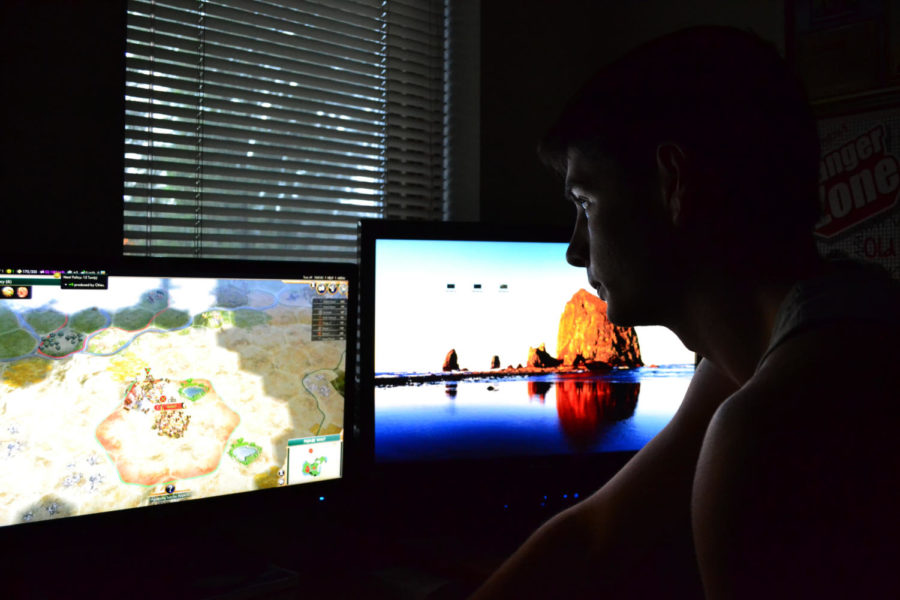Gross: Professional gaming not a real “sport”
Photo Illustration: Brian Achenbach/Iowa State Daily
Playing video games has become more than just a pastime. It has become a profession where gamers compete in tournaments to win millions in prize money.
July 23, 2013
Whether it’s game applications on a cell phone or first person shooters on the newest console, nearly everyone participates in video gaming to some degree.
Regardless of how you feel about gaming, it has become a social activity as common as a pick-up game of basketball or a trip to the local swimming pool. And, just like basketball, it has grown a branch for competitive “professional” players. Competitive gaming for money or prizes, known as eSports, is a growing franchise in many nations across the globe.
The profession can be quite lucrative for those with the skill to succeed. Players win prize money in tournaments, as well as salaries or payments from team and individual sponsors. In International 3, the DotA 2 (Defense of the Ancients) competition earlier this year, the largest eSports pool prize in history was set at $2,000,000. Even split among five-man teams, that’s a hefty chunk of cash.
Individuals who make a living off of professional gaming get more than money, however. International prestige within the sphere of online gamers, as well as at-home fame are just some of the side-effects. In many countries, such as South Korea, pro gamers get all the recognition of pop music artists or athletes. And just as various athletes make their way to Summer or Winter Olympics, so may professional gamers in the years to come.
Satirical gaming news website Play4Real caused commotion on July 13 when they published a piece with the headline “League of Legends now official Olympics sport.” Many who were unfamiliar with the website or their form of humor took their article as fact. Online forums erupted with discussion over the “decision,” many in excitement, many in horror. The buzz quickly died down as everyone realized the piece was simply a joke.
However, this satire article did not appear from nowhere. Discussion over the worthiness of eSports as a professional sport or even as an Olympic sport has appeared in more serious contexts. Nearly a year ago, Forbes published an article on the topic, arguing that some games, specifically League of Legends and Starcraft 2, may become Olympic sports as soon as the 2020 games.
Gamer Institute CEO Danial Grzelak is interviewed in the article, and touches on the “virtues” of Olympics eSports, saying, “Almost anyone can participate, no matter their race, age, or gender.”
Though this may be especially true for eSports, the inclusivity of the Olympics is already strong in most events. Though most competing individuals may be of a certain age or race, the bottom line is if you’re good enough, you make it. As for gender, events are split into categories by gender already, making gender exclusion a non-issue.
Competitive gaming unarguably requires a lot of commitment, practice and skill, just as other sports do. However, the Olympics have always been a competition of physical prowess, measuring the strength, finesse and athleticism of its participants.
Olympic events such as synchronized swimming or dressage often endure much ridicule for not following this guideline of athleticism. Imagine the outrage if eSports were announced as a potential Olympic sport, considering the lack of physical aptitude necessary for competing. Any such announcement would arrive on the heels of the news that Olympic wrestling may not take place in the 2020 games, or any future games.
Though pro gamers and pro athletes share similar fame, wealth and popularity, the similarities stop there. Professional Starcraft 2, DotA and League of Legends players can get the desired recognition and money from international tournaments. Certainly the teamwork and skill required in pro gaming demand respect, but not the same category of respect that Olympians get.
Whether you scoff at the idea of pro gaming or religiously tune in to the international DotA 2 podcasts, it should be generally agreed that at no point in the future should eSports be included in the long list of Olympic events.
Pro gaming requires talent, but it’s more about strength of mind than of body, the traditional focus of the Olympics. Additionally, accessibility is a poor argument in an event where skill and skill alone is the deciding factor. Professional gaming has its place, but it isn’t in Rio de Janeiro at the 2016 Summer Olympic Games.

















